My Two And A Half Weeks Of Life And Death In Mariupol, Ukraine
We did unthinkable things to survive.
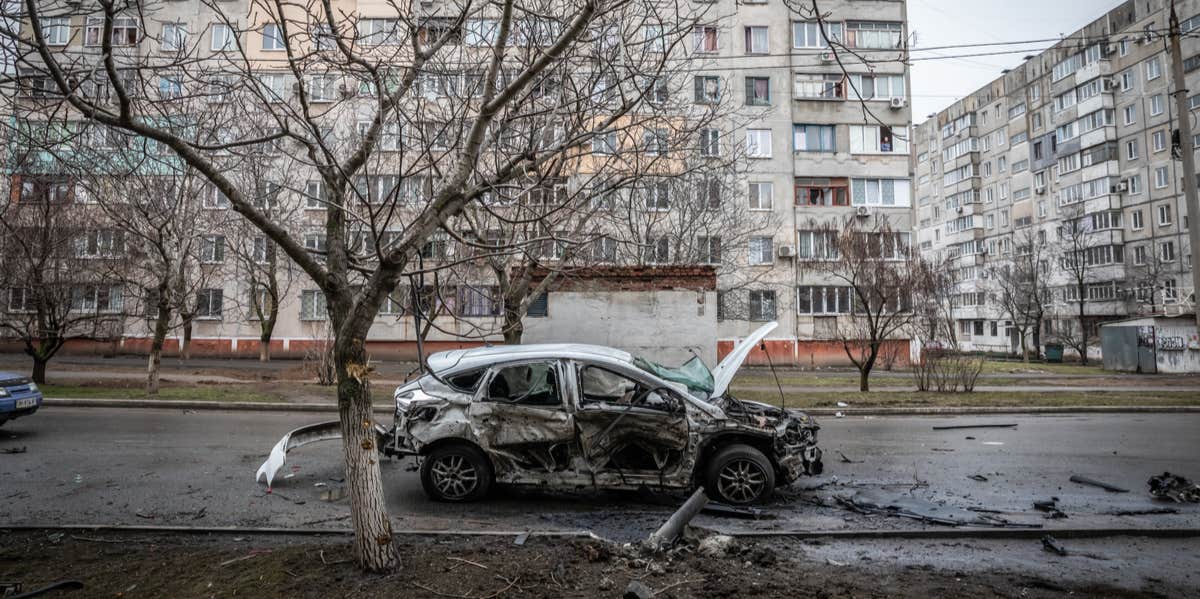 Vojtech Darvik Maca / Shutterstock
Vojtech Darvik Maca / Shutterstock I went to work in Mariupol, Ukraine at the age of 17 to pay for higher education. For several years I was a law student by day and a waitress by night.
Having received a diploma, I did not find a well-paying job in my specialty and decided to keep working in catering. Mariupol is a small city. So for nine years I met many people and knew what every corner of the city breathes.
My salary was small, but it allowed me to travel around Ukraine and save a little for a dog and for the renovation of my apartment in the central part of the city. I was satisfied with my job, my city, and my measured life.
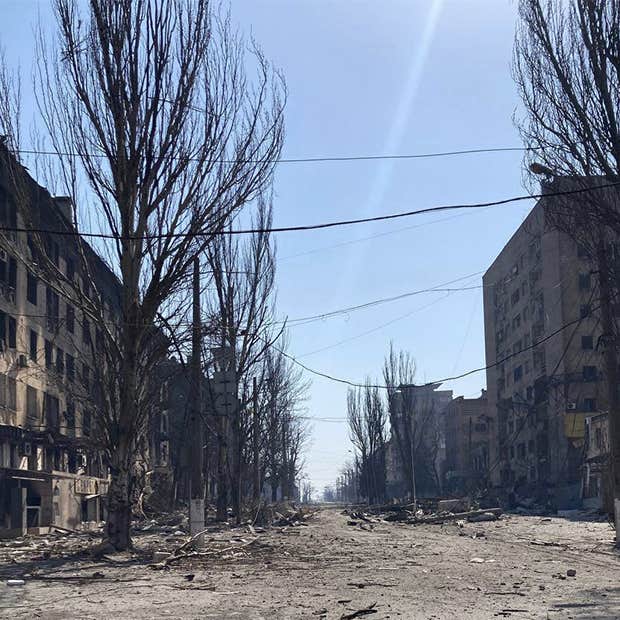
Photo: Mariupol, Ukraine
I wasn’t going to change anything. When the distant explosions began on February 24, we didn’t think it would get worse. We’d been through this previously in 2014. It didn’t last long back then and the city survived.
However, two days later things got more difficult and the explosions continued over and over again. The city was never silent. Yet we kept on living and stocked up on basic products. Gas stations and shops were still working in the city.
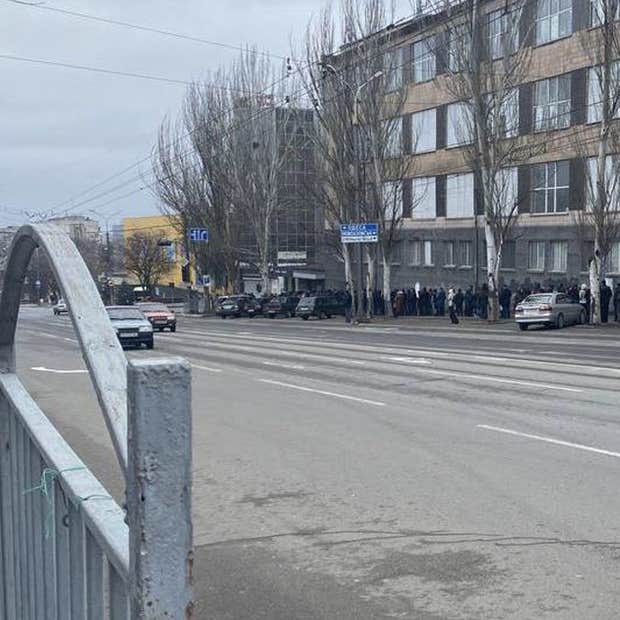
Photo: A line to a Mariupol grocery store. First days of war.
First, the power and the cell networks went out.
We managed to charge our phones in time, but without a mobile connection, we lost all means to get any information. So we were taking risks and going out into the city to find out at least something. Soon, all of the stores and pharmacies nearby got empty because of looting.
We witnessed children and adults dying because they had no insulin or medicines. People were suffering from easily treatable illnesses. A familiar soldier involved in the city resistance died of pneumonia simply due to a lack of drugs.
The only store still working was located in the front zone. People were coming and forming a line to that store, even though our military forces chased them away. And then five projectiles flew right into that line. When my boyfriend and I came there the next day, casualties were lying all around.
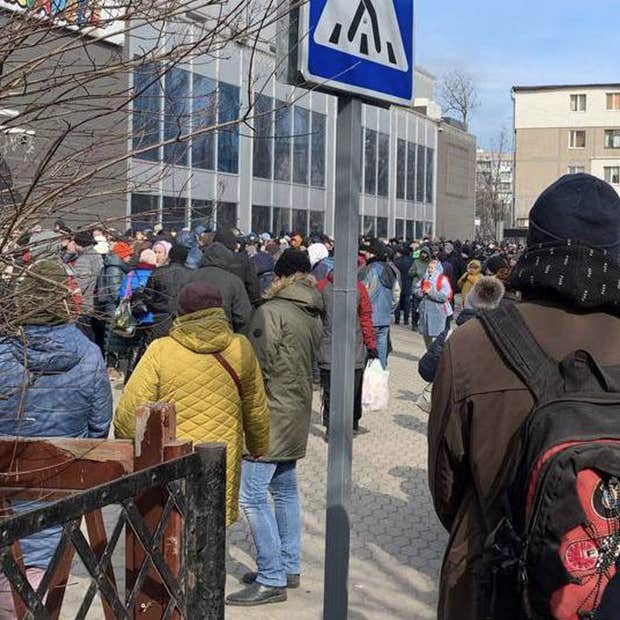
Photo: The line to the only working store left in the front zone.
I looked at the bodies and thought: those people, they are not even soldiers. These are citizens. This could have been someone’s father. Someone’s son. This isn’t normal. Yet we continued to live like it was a normal thing.
Then the water supply was gone.
Russian troops began to bomb the places where we could get water. Once we managed to get a few bottles of water, and the next day that location was shelled and dead people were scattered all around. We faced a choice between life and water.
We started to melt the snow. We gathered the wastewater. But it was running out so quickly. We used the same water to cook two eggs on the bonfire in the courtyard, then wash our socks, and then flush the toilet.
Three days later, the authorities turned off the gas supply. Before the gas was turned off, we melted wax to make new candles.
Our handmade candles.
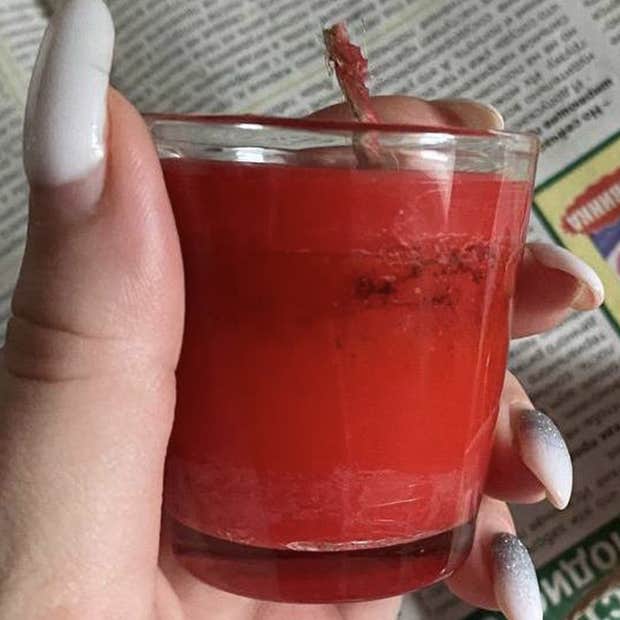
Photo: Our handmade candles
Despite the tightly closed windows, the temperature in the apartment dropped to 4 degrees celsius.
“It’s so cold I can see my breath,” I told my boyfriend once.
“No way.”
“Look then!” I rounded my lips and released a clearly visible cloud of vapor.
I realized it was no longer possible to stay in the city when they began destroying its central part. The hospital. The uni. The courthouse. I lived close to all these buildings. They seemed so indestructible. And now, often only a single wall remained of each of them, surrounded by the craters two stories deep.
The bombing became so frequent that we didn’t go out to the city anymore. Life was getting more and more depressing. When we went to bed, we didn’t know if we would wake up in the morning. And when we did wake up, we didn’t know if we were still part of Ukraine.
We asked each other about the news, but no one knew anything. It seemed like we were abandoned. Forgotten. At times, someone would dash through our courtyard from another block just to report that that block no longer exists.
Even if the authorities took some actions and organized some trains for evacuation or humanitarian corridors, there was no way for us to find out about it.
We couldn’t even contact close relatives or friends to tell them we are alive. I only have my mom, who moved to the village of Bezymianne to take care of my grandmother. This village is 40 minutes drive from Mariupol, but since 2014, it has been occupied by Russia. The last time I saw my mother was four years ago and she had to make a detour through Rostov and Kharkiv just to come visit me. The trip was way too expensive and exhausting for her.
One of those horrible days in Mariupol, I wrote her a farewell note. The thought of it reaching my mom cheered me up a bit because I knew I wouldn’t have another opportunity to say goodbye.
Common grief united us with neighbors. I shared my books with them. Оne would read a book and then retell it to those around the bonfire. Others shared batteries, lighters, and breakfast cereal, and took care of the elderly who couldn’t leave the house.
One of our aging neighbors, who was a teacher for most of her life, wouldn’t eat anything. She fed the local cats instead. Another old woman gave us a wooden kitchen board to support the bonfire.
We tried to keep the bonfire burning at all times because it was difficult and time-consuming to start a new fire from scratch. The brushwood for the fire was often wet and it took a day to dry it up before burning.
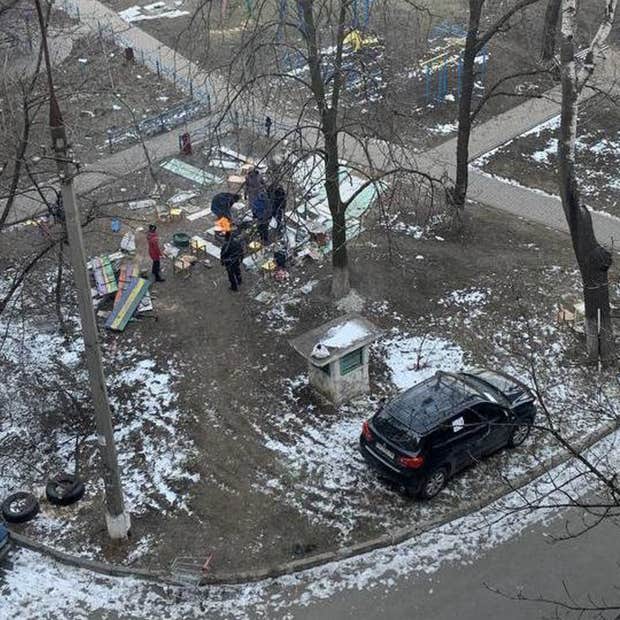
Photo: My courtyard as seen from my window.
When the kindergarten near our building got bombed, we went there to take a few chairs for our basement shelter. I came in and noticed a row of kids’ slippers. It struck me: I’m stealing from children.
This war forced us to do unthinkable things.
Later we used the children’s lockers to maintain the fire. During my last days in Mariupol, the sky was burning all the time. I was sure this was the end. I saw new destruction every day. Russia’s army was getting closer and closer. I realized it was unlikely that my house would remain intact while the whole city would get destroyed.
Once, I looked out of the window. Our U-shaped building already had three holes in it. Suddenly, I noticed someone’s blanket fluttering on a tree in the courtyard. I turned my head and saw a balcony, from which this blanket must have flown out.
The apartment was turned inside out because of the explosion. I wondered if someone was home at the moment of impact. Should I look for them? But if anyone was home, they couldn’t survive The apartment was completely burned out.
On March 13, we went upstairs for a while, and then the neighbors knocked on the door:
“There’s a way to leave the city along the quay. We depart in 15 minutes. Are you with us?”
We grabbed our backpacks, threw them into their car trunk, and drove off. I was sure we wouldn’t make it. The unfinished food remained on the kitchen table. We even left our laptops behind.
We drove out of the city without any checkpoints on our way. The road was planted with mines, but the mines were visible. It seemed suicidal, but we successfully bypassed them while I sat in the car scared to death.
When we were approaching Berdiansk, I joyfully noticed: “Look, there’s a car line coming at us!”
That would mean the road ahead is clear. But this car line wasn’t moving. It was gunned down. Driving by, I spotted clothes, wet wipes, and other everyday things inside these cars.
When we reached the Russian checkpoint near Berdiansk, the military began to gather the approaching cars into a line. It seemed that they were doing this to shoot us all at once, but they just wanted to let us through in an organized manner.
We encountered 13 to 15 such Russian checkpoints оn the way to Zaporizhzhia. Every time, they examined and checked each of us. They took our phones, money, water, and food. This delayed us a lot, so we tried to get at least somewhere before the curfew.
The Russians asked us to keep their thefts a secret, and, at the same time, they asked: “Why are you going to Ukraine, and not to our territory, or Donetsk, Lugansk?” We avoided the conflict and answered that we were going to our Ukrainian relatives, or that we were from Ukraine.
I still didn’t believe that we would get anywhere. We were hungry, we were freezing, and we had no shower for 20 days. And we were surrounded by armed people. At any moment, things could go terribly wrong. At one of the checkpoints, I saw a guy with his machine gun aimed straight at me. I had only one thought: God forbid his hands get sweaty.
When we had almost reached Zaporizhzhia, and the lights of the city lured us to the horizon, we discovered that the bridge we had to pass over had been destroyed.
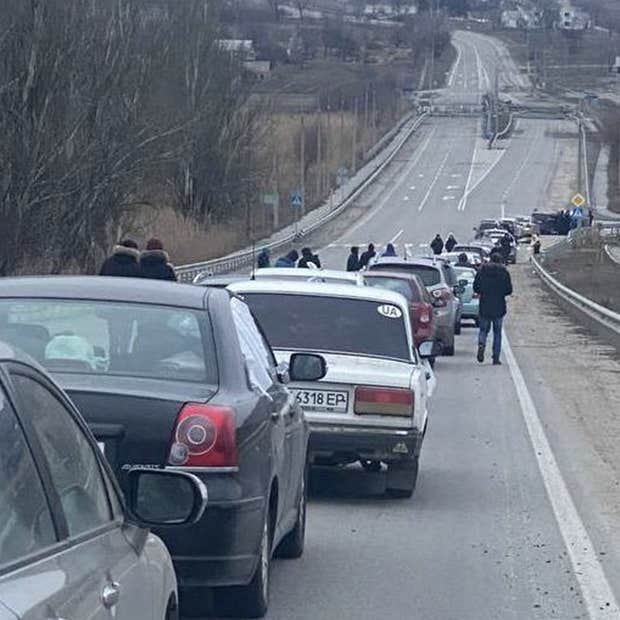
Photo: The ruined bridge to Zaporizhzhia.
A man with the most fuel in the tank found a narrow detour road nearby and went to inspect it. When he returned, he said, “The route is mined, but we can drive through. We have to drive one by one, wheel to wheel, following the leading car’s track. And we should keep our distance so that if one car explodes the others won’t be affected.”
We decided to go even though our car owner wasn’t a seasoned driver yet. When following the route, we tried not to breathe. In my mind, I was recalling all the Saints I could.
The saying goes, there are no atheists during the war. I get it now.
When it began to get dark, we finally met the Ukrainian military. At that time we formed a long line of cars.
“Who are you all?” Ukrainian soldiers asked us at the checkpoint.
“We’re from Mariupol.”
They were struck dumb.
After the ID check, the soldiers called a police patrol to escort us. With endless barbed wires, cinder blocks, and mined tires on the road we again had to drive very carefully and with the headlights off.
Several drivers were running out of patience. In the dark, they decided to overtake the line from the flank, and I saw them crash into cinder blocks.
We finally reached Zaporizhzhia. Days later, I rented an apartment in Dnipro.
I’m safe. I’m okay now.
But I still can’t believe my former life is gone.
Alyona Chausova lives in Ukraine. Follow her on Instagram.
